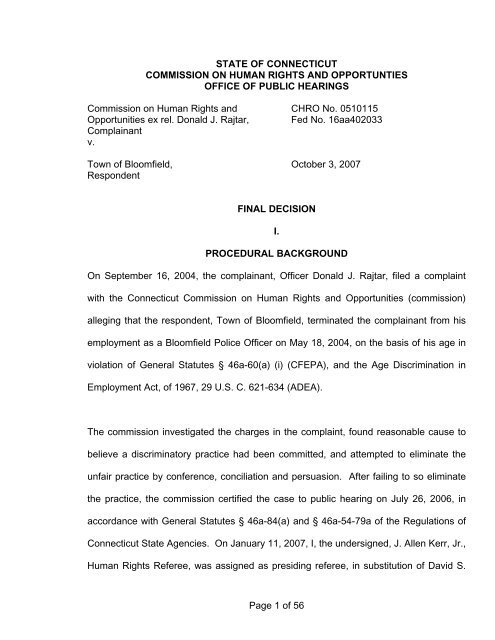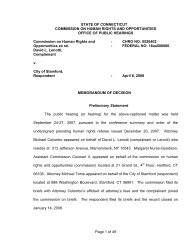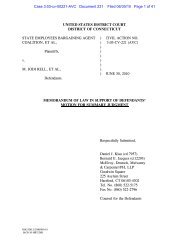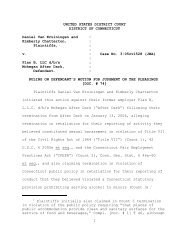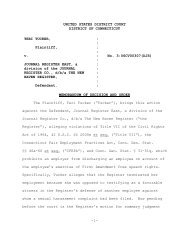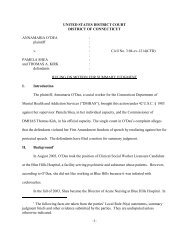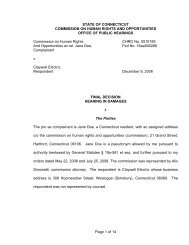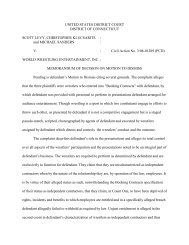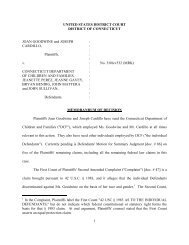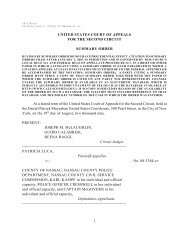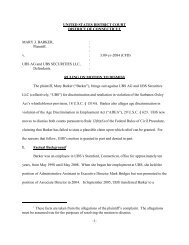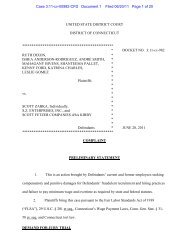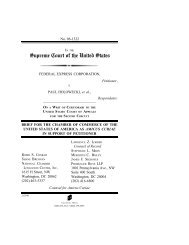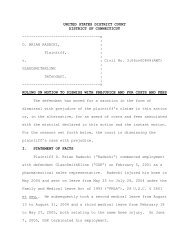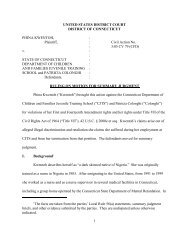CHRO ex. rel. Donald Rajtar v. Town of Bloomfield - Connecticut ...
CHRO ex. rel. Donald Rajtar v. Town of Bloomfield - Connecticut ...
CHRO ex. rel. Donald Rajtar v. Town of Bloomfield - Connecticut ...
Create successful ePaper yourself
Turn your PDF publications into a flip-book with our unique Google optimized e-Paper software.
STATE OF CONNECTICUTCOMMISSION ON HUMAN RIGHTS AND OPPORTUNTIESOFFICE OF PUBLIC HEARINGSCommission on Human Rights and <strong>CHRO</strong> No. 0510115Opportunities <strong>ex</strong> <strong>rel</strong>. <strong>Donald</strong> J. <strong>Rajtar</strong>, Fed No. 16aa402033Complainantv.<strong>Town</strong> <strong>of</strong> <strong>Bloomfield</strong>, October 3, 2007RespondentFINAL DECISIONI.PROCEDURAL BACKGROUNDOn September 16, 2004, the complainant, Officer <strong>Donald</strong> J. <strong>Rajtar</strong>, filed a complaintwith the <strong>Connecticut</strong> Commission on Human Rights and Opportunities (commission)alleging that the respondent, <strong>Town</strong> <strong>of</strong> <strong>Bloomfield</strong>, terminated the complainant from hisemployment as a <strong>Bloomfield</strong> Police Officer on May 18, 2004, on the basis <strong>of</strong> his age inviolation <strong>of</strong> General Statutes § 46a-60(a) (i) (CFEPA), and the Age Discrimination inEmployment Act, <strong>of</strong> 1967, 29 U.S. C. 621-634 (ADEA).The commission investigated the charges in the complaint, found reasonable cause tobelieve a discriminatory practice had been committed, and attempted to eliminate theunfair practice by conference, conciliation and persuasion. After failing to so eliminatethe practice, the commission certified the case to public hearing on July 26, 2006, inaccordance with General Statutes § 46a-84(a) and § 46a-54-79a <strong>of</strong> the Regulations <strong>of</strong><strong>Connecticut</strong> State Agencies. On January 11, 2007, I, the undersigned, J. Allen Kerr, Jr.,Human Rights Referee, was assigned as presiding referee, in substitution <strong>of</strong> David S.Page 1 <strong>of</strong> 56
Knishkowy. I conducted a duly noticed public hearing at commission headquarters, 21Grand Street, Hartford, <strong>Connecticut</strong>, on March 6, 7, 8, 9, 14 and 16, 2007. Pursuant tothe Post Hearing Scheduling Order dated March 20, 2007, post hearing briefs were dueby June 1, 2007 and reply briefs were due by July 6, 2007 (all timely filed) at which timethe record closed.II.FINDINGS OF FACTTranscripts referenced are herewith identified by “TR pp.” followed by the pagenumber(s). Exhibits are herewith referenced by “C” or “R” followed by the applicablenumber. The following <strong>ex</strong>hibits are duplicates (or one is contained enti<strong>rel</strong>y within theother) and as a matter <strong>of</strong> discretion and/or convenience I reserve the right to refer toonly one to the <strong>ex</strong>clusion <strong>of</strong> the other: (R-1 and C-8), (R-2 and C-4), (R-3 and C-2), (R-4and C-2), (R-5 and C-5), (R-6 and C-6), (R-7 and C-9), (R-8 and C-12), (R-9 and C-13),(R-10 and C-7), (R-23 and C-16) and (R-24 and C-17).1. The complainant was born on April 8, 1954. TR p. 10.2. The complainant was hired as a police <strong>of</strong>ficer by the respondent on August13, 1998, to be a member <strong>of</strong> its police department (department). TR p. 10.3. At the time <strong>of</strong> his termination (May 18, 2004) the complainant was a patrol<strong>of</strong>ficer (the rank at which he had been hired). TR p. 10.4. At the time <strong>of</strong> termination the complainant was the oldest patrol <strong>of</strong>fice in thedepartment. TR p. 10.Page 2 <strong>of</strong> 56
5. Prior to the complainant’s termination, he had never been disciplined by therespondent. TR p. 12.6. Chief Betsy Hard (Chief Hard) was recruited from California to becomerespondent’s chief <strong>of</strong> police on January 15, 2003. TR p. 923.7. Chief Hard testified that she was not aware <strong>of</strong> a maximum age limit for newpolice hires, but that she had sent a couple <strong>of</strong> thirty-four year old new hiresto the police academy. TR p. 986.8. The complainant’s job evaluations were all satisfactory or better. TR p. 12,C-15.9. The complainant had been counseled on the thoroughness <strong>of</strong> hisinvestigations on several occasions. TR p. 6, R-1, R-11.10. Chief Hard believed that sergeants must be empowered to truly performtheir jobs, by doing more than managing paperwork, and by leading theirpeople. TR p. 924.11. Chief Hard believed that prior to her assuming the duties <strong>of</strong> chief, thesergeants had been second-guessed and their directives dismissed. TR p.925.12. Chief Hard believed that as first line supervisors, sergeants were the mostcritical department level for imparting the direction, policies and philosophies<strong>of</strong> the department. TR p. 925.13. Louis Chapman (Chapman) has been the respondent’s town manager since1993. TR p. 1147.Page 3 <strong>of</strong> 56
14. In matters <strong>of</strong> police <strong>of</strong>ficer termination Chief Hard is the principal decisionmaker but Chapman has the power to ratify her decision or not. TR p. 1160.15. The complainant had worked in security at a nuclear plant prior to joiningthe department. TR p. 790.16. Sergeant Michael Driscoll (Sergeant Driscoll) was the complainant’ssupervisor in February <strong>of</strong> 2004, and he was born on June 13, 1965. TR p.788, 796.17. Sergeant Driscoll’s supervisor, Lieutenant Mark Samsel (LieutenantSamsel), had noticed that the <strong>rel</strong>ationship between Sergeant Driscoll andthe complainant was beginning to “divide.” TR p. 635.18. Sergeant Daniel Mathena (Sergeant Mathena) was also a supervisor <strong>of</strong> thecomplainant and was born in 1952. TR p. 552, C-29.19. Sergeant Mathena and Sergeant Driscoll were friendly and socializedoutside <strong>of</strong> work. TR p. 752.20. On February 10, 2004 or February 11, 2004 Sergeant Driscoll and SergeantMathena counseled the complainant on a case he had handled concerninga mother who wanted to report that her son had been struck at school. Shewanted only to report it to make a record, but was content to let the schoolhandle it.Sergeant Driscoll and Sergeant Mathena believed thecomplainant should have investigated the matter further and sought anarrest if warranted. The complainant disagreed and did not want to“browbeat” people into making complaints. TR pp. 533-537.Page 4 <strong>of</strong> 56
21. Sergeant Driscoll mistakenly believed the complainant was accusing him(Sergeant Driscoll) <strong>of</strong> “browbeating” him (the complainant). TR p. 804.22. On February 11, 2004 the complainant received a call that had beenstacked (delayed) nine or ten minutes about a breach <strong>of</strong> peace with afirearm at Lee’s Famous Recipe Chicken Restaurant (Lee’s). TR p. 13.23. The incident was already over when the call came in so it was not a “lightsand siren” response. TR p. 13.24. Upon arriving at Lee’s, the complainant met with the proprietor, MarlonHutchinson (Marlon) and they sat in a booth in the restaurant where Marlongave a statement, which the complainant transcribed and Marlon signed.TR pp. 14, 15.25. The statement briefly described an incident involving Marlon beingthreatened by a former employee with a firearm, which individual enteredinto a verbal altercation with Marlon and pulled a phone from the wall befo<strong>rel</strong>eaving. C-1.26. The complainant asked Marlon about witnesses and has claimed he doesnot remember the <strong>ex</strong>act wording but that Marlon indicated there were not,and that there were two employees, Roshana Hinkson (Roshana) and MarkCaines (Caines), that one was in the front and one was in the back. TR p.17.27. The complainant was unable to fully confirm the identity <strong>of</strong> the suspect,initially identified by Marlon as Joel Williams and later determined to be JoelPage 5 <strong>of</strong> 56
Williamson (Joel), and returned to headquarters to try to identify him further.TR p. 17.28. The complainant did not speak to Caines or Roshana before returning toheadquarters. TR p. 18.29. The complainant was not able to further identify the suspect at headquartersthat day. TR p. 19.30. The complainant had obtained a cursory description (young black male) <strong>of</strong>Joel and wrote it down in his notebook but did not put it in his report. TR p.20, C-1, C-14.31. The complainant had not issued a “BOLO” (“Be on the lookout for…”)because the description he had <strong>of</strong> Joel would have matched most youngmales in the area. TR pp. 24, 25.32. The complainant returned to Lee’s approximately two hours after his firstvisit to determine if Marlon had dropped <strong>of</strong>f additional information on Joel’sidentity. TR p. 25.33. Marlon was not there and the complainant spoke briefly with Roshana whotold him Marlon had not dropped <strong>of</strong>f any additional information. TR p. 26.34. The complainant maintains that he asked Roshana if she or the otheremployee had witnessed the incident and she responded in the negative.TR p. 26.35. The complainant discussed the incident briefly with Sergeant Driscoll,showed him Marlon’s statement, finished his incident report and put it inPage 6 <strong>of</strong> 56
Sergeant Driscoll’s basket at the end <strong>of</strong> his shift on February 11. TR p. 29,C-1.36. The complainant was <strong>of</strong>f duty on February 12, 13 and 14. TR p. 35.37. On February 12, 2004, Sergeant Driscoll saw the complainant’s report andrealized he had “problems” with it. TR p. 515.38. Sergeant Driscoll signed <strong>of</strong>f on the report, however, and did not send it backto the complainant although he could have. TR p. 845.39. On February 12 Sergeant Driscoll was given some additional informationabout Joel and he called Marlon as a result. TR pp. 816, 817.40. Sergeant Driscoll decided to pick up the investigation himself because thecomplainant was <strong>of</strong>f for several days. TR p. 817.41. Some sergeants would not have taken over the investigation under thecircumstances, but Sergeant Driscoll didn’t have any problems with doingso. TR p. 817.42. Sergeant Driscoll went to Lee’s and spoke with Marlon who told him therewere two other employees who had witnessed “some <strong>of</strong>” the incident. TR p.818, C-2.43. While at Lee’s, Sergeant Driscoll knew that it was possible Marlon may havespoken to Roshana or Caines after Marlon’s statement to the complainant,but he did not ask about that. TR pp. 846-848.44. Sergeant Driscoll took Caines statement which statement evidences that hehad in fact seen and heard some <strong>of</strong> the incident. C-1, C-2.Page 7 <strong>of</strong> 56
45. Later that day (February 12) Sergeant Driscoll called Roshana on thetelephone (she had not been at Lee’s during his visit). TR p. 819, C-2.46. Roshana told Sergeant Driscoll she had seen and heard some <strong>of</strong> theincident, but had not seen the gun. TR pp. 818-820, C-2.47. Sergeant Driscoll prepared a supplemental incident report (C-2) and left it inthe complainant’s box. TR pp. 35, 820.48. The complainant and Sergeant Driscoll spoke on the complainant’s return toduty, and Sergeant Driscoll was agitated and asked the complainant aboutthe other witnesses and other details missing from his report. TR p. 37.49. Sergeant Driscoll told the complainant that Roshana had told him she hadwitnessed some <strong>of</strong> the incident. TR pp. 36, 37.50. The complainant told Sergeant Driscoll that Roshana told him the opposite –that she had not seen anything. TR pp. 37, 822.51. The complainant’s focus had been on finding Joel because he believed hehad already established probable cause for an arrest. TR p. 221.52. The complainant had never been counseled to take a statement from awitness who said he had seen nothing, and had never been disciplined fornot doing so. TR p. 223.53. Although agitated, Sergeant Driscoll did not attempt to reconcile thediscrepancy with the complainant. TR p. 37.54. Sergeant Driscoll called Roshana again on February 16 and maintains thatshe told him that the complainant did not “interview or speak to her.” TR pp.823, 898.Page 8 <strong>of</strong> 56
55. Sergeant Driscoll discussed his findings and concerns about thecomplainant’s report with Sergeant Mathena. TR pp. 824, 825.56. The two sergeants were <strong>of</strong> the same mind that there were problems with thereport and Sergeant Driscoll prepared a request for a disciplinaryinvestigation <strong>of</strong> the complainant (IA request). TR p. 825, R-1.57. The IA request was prepared February 17, 2004 and delivered up the chain<strong>of</strong> command on February 18, 2004. TR p. 876, R-1.58. The IA request cited the inadequacy <strong>of</strong> the complainant’s investigation(failure to interview witnesses, document same, get statement). TR pp. 825,826, R-1.59. The IA request stated that the complainant maintained that he did speak toRoshana on February 11. R-1.60. Sergeant Driscoll was “unclear” about whether the complainant had liedbecause Roshana had not yet given a written statement. TR p. 826, R-1.61. The IA request prepared by Sergeant Driscoll confirmed that he askedRoshana if she had been “interviewed” by the complainant, and that shehad responded in the negative. R-1.62. Sergeant Driscoll concedes that there is a significant difference between aninterview and just asking someone a question. TR pp. 899, 900.63. The complainant n<strong>ex</strong>t prepared an unsigned, unsworn, undated arrestwarrant application and draft affidavit (affidavit) and submitted it to SergeantDriscoll on February 18, 2004. TR pp. 39, 831, C-4.Page 9 <strong>of</strong> 56
64. In paragraph 4 <strong>of</strong> the draft affidavit, the complainant stated that Roshanahad stated to him on the date <strong>of</strong> the incident that “…no one had witnessedthe incident.” C-4.65. It was standard practice for subordinates to submit such draft affidavits forconsideration by supervisors and the department’s general order 5.3.1,section A3 directs that if a warrant application is denied by a supervisor it isto be sent back for modifications. TR pp 41-44, C-39.66. Sergeant Driscoll, without further inquiry, concluded that paragraph 4constituted an intentional misstatement and was not covered by the generalorder. TR p. 836.67. Upon receiving the draft affidavit (probably on February 18, 2004) SergeantDriscoll went to Sergeant Mathena convinced that the complainant had liedin paragraph 4 and shared this belief with him, despite the fact that Roshanahad yet to give a written statement and had only been spoken with on thetelephone. TR pp. 859, 861.68. Sergeant Driscoll then shared his beliefs about the affidavit with Chief Hard,before a written statement had been taken from Roshana. TR p. 896.69. The complainant maintains that he included paragraph 4, knowing itconflicted with Sergeant Driscoll’s account <strong>of</strong> what Roshana had told him,because he considered it <strong>ex</strong>culpatory information (inconsistent statementsby a witness). TR p. 47.70. The complainant had been trained to include <strong>ex</strong>culpatory information in anaffidavit. TR p. 48.Page 10 <strong>of</strong> 56
71. Chief Hard concluded that a written statement from Roshana would berequired and put out a directive that she did not want Sergeant Driscolltaking it. TR p. 961.72. Sergeant Driscoll and Sergeant Mathena both concluded the complainanthad lied and Sergeant Driscoll had told Sergeant Mathena that Roshanatold him she had never been spoken to by the complainant. TR p. 545.73. It was unusual for a sergeant to have taken over the investigation and asupervisor would normally assist the investigating <strong>of</strong>ficer. TR pp. 545, 593.74. Sergeant Mathena took Roshana’s first written statement on February 20,2004. TR p. 592, C-5.75. Roshana’s sworn statement confirmed that on a first <strong>of</strong>ficer’s visit, that<strong>of</strong>ficer did not speak to her at all, but also disclosed for the first time thearrival <strong>of</strong> “another <strong>of</strong>ficer” two hours later who did ask her “…aboutinformation on Joel….” C-5.76. Roshana’s statement does not <strong>ex</strong>pand on (and hence she could notreasonably have been asked by Sergeant Mathena so to do) the identity <strong>of</strong>the second <strong>of</strong>ficer and the precise nature <strong>of</strong> the “information on Joel” he hadasked about. C-5.77. As a result <strong>of</strong> Roshana’s statement <strong>of</strong> February 20, 2004, SergeantMathena and Sergeant Driscoll had notice that a second visit was made bya police <strong>of</strong>ficer on February 11, 2004 and that he had at least spoken toRoshana about Joel. C-5.Page 11 <strong>of</strong> 56
78. It is undisputed that the second <strong>of</strong>ficer was the complainant and there is noevidence in the record to even suggest that it could have been anyone else.79. Sergeant Driscoll did not know when he had talked to Roshana for thesecond time on February 16 that when she said she hadn’t beeninterviewed by the complainant (the first <strong>of</strong>ficer to arrive who hadinterviewed Marlon), that she had in fact talked with the complainant whenhe returned a second time, but had not disclosed it because she wasunaware that it was him. TR pp. 857, 858.80. Despite the reconciliation <strong>of</strong> the then principal inconsistency that Roshana’sstatement provided, the statement did not change Sergeant Driscoll’s initialassessment that the complainant had lied and that Roshana had not spokento the complainant, inasmuch as he could ascribe (as he testified) no motivefor her to lie. TR p. 837.81. Sergeant Driscoll then met with Chief Hard to discuss what to do n<strong>ex</strong>t. TRp. 838.82. Chief Hard told Sergeant Driscoll to amend his write-up <strong>of</strong> the complainantand draft a new warrant application himself. TR p. 839.83. Sergeant Driscoll (despite Chief Hard’s directive that he not take Roshana’sstatement) took an additional written statement form Marlon on February 25,2004 and issued a February 26 supplement to his IA request. C-6, C-9.84. Sergeant Driscoll went to see Marlon on February 25, 2004 to “document”(Driscoll’s term) that the complainant had not interviewed Roshana orCaines, despite the fact that the complainant had never claimed he hadPage 12 <strong>of</strong> 56
interviewed Roshana or even that he had spoken to her during his first visitto Lee’s, which is the only visit during which Marlon was present and hencethe only visit he could have witnessed. TR p. 840.85. Sergeant Driscoll’s narrative in C-9 recounting Marlon’s statement <strong>of</strong>February 25 and Roshana’s statement <strong>of</strong> February 20 states that thecomplainant did not talk to Roshana at all in his initial response to Lee’s. Itmakes no mention <strong>of</strong> Roshana’s further disclosure in her February 20statement that she and the complainant did speak on his second visit. C-9.86. Sergeant Mathena was still unclear in his testimony before the commissionin March <strong>of</strong> 2007 whether the complainant was the second <strong>of</strong>ficer to appearat Lee’s on February 11, 2004. TR pp. 594-597.87. Before filing his C-9 supplement Sergeant Driscoll never approached thecomplainant to discuss differences between his version <strong>of</strong> the facts andRoshana’s, particularly with respect to <strong>ex</strong>ploring reconciliation <strong>of</strong> her denialthat she had been “interviewed” and his claim (and hers) that he hadquestioned her. TR p. 900.88. There was no follow up by Sergeant Mathena or Sergeant Driscoll toRoshana’s disclosure in her February 20, 2004 affidavit that she had spokento the second <strong>of</strong>ficer to arrive on February 11 (who could not have beenanyone other than the complainant), as there is no evidence that this waspursued until a second statement was given to Lieutenant Matthew Willauer(Lieutenant Willauer) on March 8, 2004 in his role as <strong>Rajtar</strong> IA investigator.Page 13 <strong>of</strong> 56
C-7. Note: Lieutenant Willauer held the rank <strong>of</strong> sergeant during the timeperiod covered by some <strong>of</strong> these findings.89. Sergeant Driscoll never talked to the complainant about the differencesbetween “talking” with a witness and “interviewing” a witness despiteknowing that Roshana had said she had not been “interviewed” and that thecomplainant had never claimed to have “interviewed” her, before filing hisFebruary 26 C-9 supplement to his IA request. TR p. 900.90. Prior to submitting C-9 Sergeant Driscoll did not do a background check onMarlon, never asked Marlon if he was satisfied with the complainant’sresponse and never personally interviewed Roshana. TR p. 907.91. Chief Hard forwarded Sergeant Driscoll’s IA request (R-!) to thedepartment’s pr<strong>of</strong>essional standards unit on February 24, 2004. TR p. 927.92. Lieutenant Willauer received a written directive from Chief Hard to conductan internal affairs investigation (the <strong>Rajtar</strong> IA) on February 26, 2004. TR p.356.93. Chief Hard forwarded Sergeant Driscoll’s supplement (C-9) to LieutenantWillauer after she received it from Sergeant Driscoll. TR p. 933.94. The supplement (C-9) focused on the complainant’s statement in the draftaffidavit he prepared that Roshana stated to him there were no witnesses,juxtaposed with Sergeant Driscoll’s conclusion that the complainant did not“interview” Roshana, and his use <strong>of</strong> Roshana’s statement <strong>of</strong> February 20and Marlon’s statement <strong>of</strong> February 25 to establish that the complainantPage 14 <strong>of</strong> 56
never talked to Roshana, while ignoring her disclosure in the statement thatshe did talk with a second <strong>of</strong>ficer. C-9.95. Chief Hard did not consider Sergeant Driscoll’s request for an IA <strong>of</strong> thecomplainant to be that serious. It was for an inadequate investigation,which was a competency issue that could have been dealt with in differentways, such as a performance plan (remedial training). TR pp. 963-965.96. It was Sergeant Driscoll’s February 26 C-9 supplement that alleged that thecomplainant had been dishonest in his draft affidavit for a warrant that wasdeemed serious. C-9.97. On February 26, 2004, Lieutenant Willauer issued written notice <strong>of</strong> the<strong>Rajtar</strong> IA to the complainant and CIPU Local 14 President, Steve Tonkin.The allegations therein were that the complainant had failed to completeseveral core investigative tasks, had falsely attributed statements to Marlonand Roshana and had provided false information in a draft arrest warrantaffidavit <strong>rel</strong>ative to Roshana’s statements to him. R-11.98. The complainant’s unsworn interview with Lieutenant Willauer was tapedand transcribed and the complainant was interviewed twice, on March 3,2004 and March 8, 2004. R-8, R-9.99. The complainant told Lieutenant Willauer that upon arriving at Lee’s onFebruary 11, 2004 he asked Marlon (after Marlon had described the gunincident with Joel) if anyone else was involved. The complainant repliedthat Marlon said, “No, other employees were in the store, one was in thefront and one was in the back.” R-8 lines 70, 71.Page 15 <strong>of</strong> 56
100. The complainant also stated to Lieutenant Willauer that he had forgotten the<strong>ex</strong>act words Marlon had used. R-8 lines 237, 238.101. The complainant told Lieutenant Willauer that on his second trip to Lee’s,Roshana replied “no” to his question whether she or Caines had seenanything during the “event” and she stated that she was in the front and theother employee was in the back. R-8 lines 266-272.102. The complainant told Lieutenant Willauer that after reading SergeantDriscoll’s supplemental incident report (C-2) he saw Sergeant Driscoll fourtimes on February 16, that Sergeant Driscoll was irate when he tried to<strong>ex</strong>plain what he had found and that in the final <strong>ex</strong>change with SergeantDriscoll was told, “…tell it to Willauer…I already put you in for discipline.” R-8 lines 345-353.103. During the March 3 interview the complainant suggested that the Lee’semployees talk and gossip among themselves and suggested that Roshanaand Caines may have discussed what had happened between themselvesin an effort to lash out at Joel. R-8 lines 538, 539.104. During the March 3 interview the complainant also speculated that Roshanaand Caines may have discussed their accounts <strong>of</strong> what happened and notreally remembered what happened, but had stories in their head, which iswhy the complainant concluded Roshana was not aware that he was the<strong>of</strong>ficer who had responded a second time on the day <strong>of</strong> the incident. R-8lines 537-541.Page 16 <strong>of</strong> 56
105. The complainant confirmed to Lieutenant Willauer in the March 3 interviewthat he stood behind his statement in paragraph 4 <strong>of</strong> the draft affidavitconcerning Roshana’s statement to him. R-8 line 562.106. Lieutenant Willauer interviewed Roshana after the complainant’s firstinterview on March 3 but did not take her statement at that time. TR p. 380.107. Lieutenant Willauer asked Roshana if the second <strong>of</strong>ficer had questioned herabout witnessing the “incident” and she replied in the negative. R-11.108. In the complainant’s March 8, 2004 interview Lieutenant Willauer againasked about the complainant’s account <strong>of</strong> what Marlon had told him andasked if he could quote <strong>ex</strong>actly what Marlon had told him. The complainantresponded that he could not and again gave his general account <strong>of</strong> whatMarlon had said. R-9 lines 127-136.109. The complainant was also asked in the March 8 interview if he couldremember <strong>ex</strong>actly what he had asked Roshana and <strong>ex</strong>actly what she hadsaid in reply during his second visit to Lee’s and he responded that he couldnot and again gave his basic account. R-9 lines 138-146.110. After the complainant’s second interview on March 8 Lieutenant Willauerreturned to Lee’s again and took an additional written statement (C-7) fromRoshana wherein she stated that the second <strong>of</strong>ficer did not ask her whethershe had witnessed the incident. He also interviewed Marlon who denied hehad said there were no witnesses. Both Roshana and Marlon wereinformed that they were being interviewed regarding <strong>of</strong>ficer performance.R-11.Page 17 <strong>of</strong> 56
111. Lieutenant Willauer’s report concluded that the complainant’s investigation<strong>of</strong> the incident at Lee’s was inadequate in a number <strong>of</strong> respects andhighlighted the inconsistencies between the complainant’s testimony aboutwhat Marlon and Roshana told him and their accounts to Sergeant Driscolland to him. He concluded that he could not “surmise” any motivation forRoshana or Marlon to lie and that the complainant was the only partyquestioned with any motivation to be dishonest. R-11.112. Lieutenant Willauer conceded that civilians at a crime scene don’t alwaystell the truth. TR p. 386.113. Lieutenant Willauer never questioned Roshana about her <strong>rel</strong>ationship toJoel or whether she had a problem with police <strong>of</strong>ficers. TR p. 391.114. Lieutenant Willauer did not investigate whether Marlon had a criminalrecord, although it came to his attention that he did prior to his issuing hisreport, but he did not include it. TR p. 392.115. Lieutenant Willauer conceded that at no time had Roshana stated that shehad seen a gun. TR pp. 396, 397.116. Lieutenant Willauer conceded that if the complainant’s draft affidavit weretrue, that paragraph 4 would be properly included as <strong>ex</strong>culpatory evidence.TR p. 482.117. Lieutenant Willauer was not aware <strong>of</strong> any effort by Sergeant Driscoll tocontact the complainant about the discrepancy between the complainant’sdraft affidavit and Sergeant Driscoll’s account <strong>of</strong> Roshana’s story from thetime Sergeant Driscoll became aware <strong>of</strong> the conflict until the time hePage 18 <strong>of</strong> 56
submitted his February 26, 2004 C-9, although he did send SergeantMathena out to take a statement from Roshana. TR pp. 482-484.118. Lieutenant Willauer did not seriously consider whether there might havebeen a misunderstanding between the complainant and Marlon. R-11.119. Lieutenant Willauer concluded the complainant had lied, and Marlon andRoshana had not, because <strong>of</strong> his belief that only the complainant had amotive to lie. TR p. 389, R-11.120. Lieutenant Willauer’s testimony as to whether the complainant wasinconsistent (changed his position) during the <strong>Rajtar</strong> IA interviews was itselfinconsistent and utterly inconclusive. TR pp. 411, 412, 442, 443, 495, 496.121. On March 19, 2004, ten days after Lieutenant Willauer completed hisinvestigation, Chief Hard placed the complainant on paid administrativeleave. R-15.122. On said date (March 19) Chief Hard also issued a notice to terminate thecomplainant’s employment for having failed to perform a complete andthorough p<strong>rel</strong>iminary investigation, fabricating a false witness utterance inan affidavit and making false statements during an IA investigation. R-15.123. Chief Hard made note in her recommendation that the issue <strong>of</strong> truthfulnesshad arisen during the investigation and that the original issue had involvedonly an incomplete investigation. R-15.124. The truthfulness issues, triggered by Sergeant Driscoll’s C-9 supplement,brought the incident to a much greater level. R-15.Page 19 <strong>of</strong> 56
125. On March 15, 2004, four days before issuing her recommendation, ChiefHard secured a memorandum from Deputy Chief Weisher detailing theproblems an <strong>of</strong>ficer could cause to his department after having been foundto have been untruthful in the performance <strong>of</strong> his duties. R-13.126. Actual decertification <strong>of</strong> an <strong>of</strong>ficer by the State <strong>of</strong> <strong>Connecticut</strong> would require,however, clear and convincing pro<strong>of</strong> <strong>of</strong> a lie under oath and there is noclaim that the complainant ever lied under oath or in a sworn affidavit. TRpp. 991, 992.127. In her recommendation, Chief Hard <strong>rel</strong>ied on Lieutenant Willauer’s findingsand the supporting documents he included and she did not conduct aninvestigation <strong>of</strong> her own. TR p. 104.128. Chief Hard never spoke to Marlon, Roshana or Caines. TR p. 998.129. Chief Hard did not discuss Lieutenant Willauer’s investigative findings withthe complainant. TR p. 938.130. If the complainant had been found only to have conducted an inadequateinvestigation he would likely have received a sanction less severe thantermination. TR p. 999.131. During her employment with the department, Chief Hard had neverrecommended suspension for an <strong>of</strong>ficer found to have conducted anincomplete investigation with no prior disciplinary record. TR p. 1000.132. Chief Hard had recommended a suspension <strong>of</strong> approximately one week foran <strong>of</strong>ficer found to have conducted an incomplete investigation where the<strong>of</strong>ficer had a prior history <strong>of</strong> discipline. TR pp. 1000, 1001.Page 20 <strong>of</strong> 56
133. The complainant had no prior history <strong>of</strong> discipline. TR p. 1000.134. Chief Hard met with the complainant on March 19, 2004 to tell himpersonally <strong>of</strong> her recommendation. TR p. 938.135. Earlier that day (March 19), the complainant had completed an interviewwith Captain Jeffrey Blatter (Captain Blatter) wherein with reference to an IAinvestigation he had initiated against Sergeant Driscoll (Driscoll IA), thecomplainant disclosed specifically for the first time that his complaint waspredicated on age discrimination. TR p. 959. Note: Captain Blatter held therank <strong>of</strong> lieutenant during the time period covered by some <strong>of</strong> these findings.136. Captain Blatter told Chief Hard that the Driscoll IA contained an agediscrimination claim by the complainant after the March 19 interview. TR p.959.137. The complainant’s interview with Captain Blatter came about as a result <strong>of</strong> achain <strong>of</strong> events that began with the complainant preparing a grievance to befiled against Sergeant Driscoll on March 3, 2004. R-22, R-22a.138. On March 4, 2004 a narrative authored by the complainant outlining theevents <strong>of</strong> the Lee’s incident and claiming discrimination in violation <strong>of</strong> theunion contract and state and federal law was received by LieutenantSamsel. R-22, R-22b, R-22e.139. On March 8, 2004 Lieutenant Samsel was presented with the actualgrievance. R-22, R-22b, R-22e.Page 21 <strong>of</strong> 56
140. The complainant had presented his concerns initially to Sergeant MichaelGerrish (Sergeant Gerrish) and was surprised to learn that Sergeant Gerrishhad informed Lieutenant Samsel. TR p. 195.141. Lieutenant Samsel met with the complainant on March 8, 2004 at whichtime the complainant stated he believed Sergeant Driscoll wasdiscriminating against him, was holding him to a higher standard thanothers, had been disrespectful to him and wanted him (complainant)terminated. R-22, R-22e.142. During the March 8 interview the complainant stated that Sergeant Driscollwanted him to fail in his tasks, <strong>ex</strong>pected more <strong>of</strong> him than others, talked tohim disrespectfully and required <strong>of</strong> him things he had not required <strong>of</strong> other<strong>of</strong>ficers he had supervised. R-22, R-22e.143. On dates in March uncertain Lieutenant Samsel obtained written statementsfrom Sergeant Mathena and Sergeant Driscoll contesting the complainant’sclaim. R-22, R-22d, R-22f.144. Lieutenant Samsel was division commander and was aware that the<strong>rel</strong>ationship between Sergeant Driscoll and the complainant was beginningto “divide”. TR p. 635.145. Lieutenant Samsel filed a memorandum with Chief Hard on March 8, 2004summarizing his findings to date and containing his interview with thecomplainant and statements from Sergeant Mathena and Sergeant Driscoll.R-22, R-22e.Page 22 <strong>of</strong> 56
146. On or about March 10, 2004 Lieutenant Samsel put in a request for adisciplinary investigation against Sergeant Driscoll and Chief Hard orderedan IA (Driscoll IA) on that date. R-22g.147. Lieutenant Samsel had no involvement with the Driscoll IA thereafter. TR p.657.148. Captain Blatter was asked by Chief Hard to take over the Driscoll IA. TRpp. 675, 676.149. Captain Blatter received the grievance results Lieutenant Samsel hadacquired. TR pp. 679, 680.150. The complainant came in for an interview on March 19, 2004 (the day hewas to be suspended and recommended for termination by Chief Hard inthe <strong>Rajtar</strong> IA) and brought a five page typewritten narrative, detailing thecomplainant’s claims <strong>of</strong> discrimination against Sergeant Driscoll, allsubsequent to Lieutenant Samsel having obtained a statement fromSergeant Driscoll. TR pp. 683, 684, R-22, R-22c.151. Prior to his interview <strong>of</strong> the complainant on March 19, Captain Blatterinterviewed a number <strong>of</strong> <strong>of</strong>ficers who consistently portrayed SergeantDriscoll as hands on, detail orientated and approachable. One <strong>of</strong>ficer,Officer Medina, stated that on a couple <strong>of</strong> occasions he believed SergeantDriscoll treated the complainant differently than others. R-22, R-22h.152. During the complainant’s interview on March 19 Captain Blatter becameaware for the first time that the complainant was claiming agediscrimination. TR p. 692.Page 23 <strong>of</strong> 56
153. Captain Blatter never met with Sergeant Driscoll during his investigation (theDriscoll IA). TR p. 692.154. Captain Blatter had been Sergeant Driscoll’s supervisor. TR p. 697.155. Captain Blatter never asked Sergeant Driscoll about the complainant’s agediscrimination claim. TR pp. 724, 725.156. Sergeant Driscoll’s written statement does not address age discrimination.TR p. 727, R-22.157. Captain Blatter did not ask any <strong>of</strong> the witnesses about possible agediscrimination. TR p. 728.158. Captain Blatter did not interview any witnesses at all after learning for thefirst time that the complainant’s claim (Driscoll IA) was age based. TR p.740.159. The “pyramid <strong>of</strong> power” was the complainant to Sergeant Driscoll toLieutenant Samsel with Lieutenant Samsel supervising both. TR p. 746.160. Captain Blatter stated Lieutenant Samsel had not disclosed any problemsbetween Sergeant Driscoll and the complainant, despite LieutenantSamsel’s testimony being to the contrary. TR p. 747.161. Captain Blatter’s interview <strong>of</strong> Lieutenant Samsel was not thorough orcomprehensive. TR pp. 748, 749.162. Captain Blatter did a “Google” inquiry on the complainant on his computeras a result <strong>of</strong> a tip <strong>of</strong>f, but not on anyone else. TR p. 753.163. Captain Blatter <strong>rel</strong>ied on Sergeant Driscoll’s statement, which was givenbefore age was an issue in the investigation. TR p. 763.Page 24 <strong>of</strong> 56
164. Officers may be <strong>rel</strong>uctant to give testimony against a sergeant and CaptainBlatter attempted to allow for that. TR p. 780.165. The Driscoll IA concluded that the complainant’s allegations were notsupported and recommended Sergeant Driscoll’s <strong>ex</strong>oneration on April 9,2004. R-22, R-22-h.166. Chief Hard became aware <strong>of</strong> the fact that the Driscoll IA being conducted byCaptain Blatter was predicated on the complainant’s age discriminationclaims on the same day she recommended the complainant’s termination,but she did not await the completion <strong>of</strong> the Driscoll IA or reconsider theissuance <strong>of</strong> her written recommendation. R-15, R-16.167. Chief Hard was satisfied with Captain Blatter’s handling <strong>of</strong> the Driscoll IA.TR p. 1054.168. There is no evidence <strong>of</strong> any significant activity in the <strong>Rajtar</strong> IA or the DriscollIA from the time <strong>of</strong> the complainant’s suspension on March 19, 2004 andCaptain Blatter’s recommendation that Sergeant Driscoll be <strong>ex</strong>onerated onApril 9, 2004 until late April when both IA’s culminated with quite differentresults.169. While Chapman as town manager made the final decision on whether todiscipline the complainant, Chief Hard was the principal decision maker inhis mind. TR p. 1166.170. A hearing was held regarding Chief Hard’s recommendation to terminate thecomplainant on April 19, 2004 in the town hall. C-42.Page 25 <strong>of</strong> 56
171. None <strong>of</strong> the witnesses to the Lee’s incident (Roshana, Marlon or Caines)testified at the hearing before Chapman. TR p. 1160.172. Age discrimination was not dealt with in the hearing before Chapman. TR p.1185.173. Chief Hard did not disclose to Chapman prior to his decision that thecomplainant had made an age discrimination complaint (Driscoll IA) againstSergeant Driscoll. TR pp 1184-1186.174. Chief Hard “could not find any motive” why the witnesses would lie(although the record is silent as to any efforts by her or her investigators toidentify any possible motivation or bias). TR p. 949.175. Chapman decided to uphold Chief Hard’s recommendation to terminate thecomplainant after the hearing. TR p. 1167.176. Chapman took the action he did because he believed the complainant hadlied and because he refused to acknowledge it. TR p. 1174.177. Chapman <strong>rel</strong>ied on Lieutenant Willauer’s investigation. TR p. 1167.178. At the time <strong>of</strong> Chapman’s decision he had no knowledge <strong>of</strong> the Driscoll IA.TR pp. 1184, 1185.179. Through negotiations with the union – and after the hearing beforeChapman but before rendering his decision – Chapman <strong>of</strong>fered thecomplainant a suspension, which required a public apology and acceptance<strong>of</strong> wrongdoing, but the <strong>of</strong>fer was rejected. TR pp. 1162-1164.180. On April 20, 2004, one day after Chapman had ratified Chief Hard’srecommendation to terminate the complainant, she issued a writtenPage 26 <strong>of</strong> 56
<strong>ex</strong>oneration <strong>of</strong> Sergeant Driscoll clearing him <strong>of</strong> all the complainant’sdiscrimination charges against him in the Driscoll IA. R-22.181. Officer Robert Spellman (Officer Spellman) has been a patrol <strong>of</strong>ficer with thedepartment since 1996. TR p. 306.182. Officer Spellman was born on June 22, 1956. TR p. 307.183. Prior to the commission hearing the respondent produced a number <strong>of</strong>interdepartmental emails containing “ageist” humor, particularly regardingOfficer Spellman. C-20.184. Of the emails contained within C-20, one dated July 27, 2002 purportedlyfrom Officer Spellman and directed to the entire department (necessarilyincluding the complainant) makes reference to his (Spellman’s) 4 pmbedtime, prune juice, fig juice, being as old as dirt, civil war service,drooling, adult diapers and being decrepit and feeble. C-20.185. The email dated July 25, 2003 purportedly from Officer Spellman tonumerous department members (including the complainant – who wasapproximately two years older than Officer Spellman) makes reference tohis (Spellman’s) being forgetful, mindless, unable to bathe, moving to aretirement center and being a wrinkly skinned guy who drools on himselfand wears oversized diapers. C-20.186. An email dated September 13, 2005, purportedly from Officer Spellman tovarious department members (the complainant had already beenterminated), makes reference to Sergeant Mathena “blowing me up duringPage 27 <strong>of</strong> 56
oll call” and Sergeant Mathena generally teasing him about his age,handicap permits and limp arms. C-20.187. An email dated October 31, 2005 purportedly from Officer Spellman to theentire department makes reference to his (Spellman’s) “old ticker’ and prunejuice. C-20.188. The four emails contained in C-20 were not actually sent by OfficerSpellman but by someone unknown who had access to his computer andused it on occasions when he had failed to log <strong>of</strong>f. TR p. 310.189. Officer Spellman found the emails derogatory to an older person but did notcomplain. TR p. 311.190. The July 27, 2002 email was addressed to everyone including Chief Hard.TR p. 273.191. By way <strong>of</strong> a November 1, 2004 email Captain Blatter addressed the emailsituation generally. C-21.192. Blatter’s November 1 email was addressed to certain supervisors, includingLieutenants Willauer and Samsel. C-21.193. Captain Blatter’s November 1 email states that while the ageist emails areharmless, requiring only a “gentle cautionary reminder,” those who areunscrupulous might “twist” them and they could be used in a frivolouscomplaint. C-21.194. Chief Hard remained unwilling at the hearing before the commission tocharacterize the C-20 emails as inappropriate, although she testified thatthey reflected less than the best <strong>of</strong> judgment. TR p. 1118.Page 28 <strong>of</strong> 56
195. Multiple copies <strong>of</strong> a pamphlet entitled “Law Enforcement Response to theNeeds <strong>of</strong> Elderly Persons” compiled by the Southwestern <strong>Connecticut</strong>Agency on Aging, were “humorously” directed only to Officer Spellman.Officer Spellman complained to a supervisor. TR pp. 324, 325, C-24.196. Officer Spellman responded to this event with a May 11, 2006 email to thepresumed pamphlet perpetrator, and this email contained his own ageisthumor and references to an internal affairs investigation, a <strong>CHRO</strong>complaint, the EEOC and suing the department for a “gazillion dollars.” C-23.197. Chief Hard responded on May 11 by email to the Spellman email (copied tothe entire department) addressing the complainant’s complaint before thecommission and instructing Officer Spellman to stop such responsesbecause they served to feed into “this whole climate.” TR p. 320, C-23.198. Chief Hard further addressed the email situation in her May 11 email bystating that while such emails (the Spellman email) were “humorous”, acomplaint was pending before the commission. C-23.199. Sergeant Gerrish would sometimes address Officer Spellman and thecomplainant at morning roll call in a louder voice than others as if to implythat they could not hear, sometimes in front <strong>of</strong> supervisors, and was notadmonished for it. TR pp. 270, 308, 309.200. On one occasion Deputy Chief Weisher laughed at Sergeant Gerrish’s“humor”. TR p. 271.Page 29 <strong>of</strong> 56
201. Age <strong>rel</strong>ated jokes and derogatory comments about Geritol, prune juice andwheelchairs were made around the department. TR pp. 271, 272.202. Sergeant Mathena, who took Roshana’s first written statement, referred toOfficer Spellman as “old Bob” and joked with him about not being able tohear. TR pp. 603, 604.203. Lieutenant Willauer would sometimes refer to the complainant and OfficerSpellman as “young man” (despite their being older than him), but could notidentify anyone else he addressed by this term. TR pp. 267, 268, 397, 398204. The complainant found being called “young man” <strong>of</strong>fensive. TR p.181.205. Lieutenant Willauer made mention that the complainant wore collaredcivilian shirts when reporting for duty. TR p. 398.206. Lieutenant Willauer found it “entertaining” that the complainant always worea collared shirt to work – always dressed nice – “whereas the rest <strong>of</strong> usdress like bums.” TR p. 399.207. Lieutenant Willauer would make fun <strong>of</strong> the complainant about his collaredshirts. TR p. 399.208. Lieutenant Willauer knew about Sergeant Gerrish talking loud at roll call anddid nothing about it. TR p. 426.209. Sergeant Driscoll had referred to older drivers as “Q-tips” and told thecomplainant that he fit a certain criminal pr<strong>of</strong>ile because <strong>of</strong> his age. TR p.51.210. On November 1, 2005, Captain Blatter (who headed the Driscoll IA) emailedLieutenant Willauer (who headed the <strong>Rajtar</strong> IA) and Lieutenant Samsel (whoPage 30 <strong>of</strong> 56
handled the complainant’s grievance against Sergeant Driscoll) and <strong>of</strong>fereda “gentle cautionary reminder” that ageist emails such as Officer Spellman’semail <strong>of</strong> October 31, 2005 could be used by a person who is unscrupulousto support a frivolous claim. Captain Blatter made specific reference in theemail to the age discrimination case pending before the <strong>CHRO</strong>. TR p. 426,C-21.211. In an incident, which occurred closely in time to the complainant’s dismissaland Sergeant Driscoll’s absolution, four <strong>Bloomfield</strong> policemen weredisciplined as a result <strong>of</strong> an incident, which occurred on April 14, 2004 ontown property. C-18, C-29.212. Probationary Officer David Provender (DOB July, 1976), Officer SeanCecchini (DOB May, 1968) Joseph Babkiewicz (DOB July, 1977) andSergeant Michael Sergeant Gerrish (DOB January, 1970) were disciplinedfor various levels <strong>of</strong> misconduct involving <strong>of</strong>f duty drinking and ramming aportable toilet (“porto potty”) with their vehicles, which event was termed“choir practice.” Damages to public property were assessed at $3,400. C-18, C-29.213. Investigations were conducted by Captain Blatter and Lieutenant Willauer.All <strong>of</strong>ficers were charged with <strong>of</strong>fenses and Sergeant Gerrish was chargedadministratively (not criminally) with driving under the influence <strong>of</strong> alcohol, acharge later sustained by Chief Hard when she issued her findings on May24, 2004. C-18, C-29.Page 31 <strong>of</strong> 56
214. The charges were sustained against all, but no one was terminated andsuspensions were measured in weeks. Chief Hard noted her hope thateach <strong>of</strong> the <strong>of</strong>ficers would “mature.” C-18, C-29.215. The four police <strong>of</strong>ficers ranged from approximately fourteen to twenty threeyears younger than the complainant. C-18, C-29.216. On July 22, 2004 Lieutenant Willauer opened a disciplinary investigationagainst Officer Isaac Medina (Officer Medina) (DOB October 1970) for hishandling <strong>of</strong> a threatening complaint. C-17, C-29.217. The investigation occurred only a couple <strong>of</strong> months after the complainant’stermination and was again conducted by the same lieutenant (Willauer) whohad conducted the <strong>Rajtar</strong> IA. C-17, C-29.218. Officer Medina is approximately sixteen years younger than thecomplainant. C-17, C-29.219. The thrust <strong>of</strong> the charges was that Officer Medina attributed statements towitnesses, which they disputed. C-17, C-29.220. Officer Medina was interviewed by Sergeant Willauer. C-17, C-29.221. Lieutenant Willauer’s report found Officer Medina to have been dishonest inhis interviews and notes that he had received disciplinary counseling on twoprevious occasions. C-17, C-29.222. Officer Medina also received counseling from Lieutenant Willauer himselfand Captain Blatter. C-17, C-29.Page 32 <strong>of</strong> 56
223. Lieutenant Willauer concluded that he found it “unfathomable” that OfficerMedina could not remember in his interview whether he had obtained thepermission <strong>of</strong> one <strong>of</strong> the witnesses to seize his firearm. C-17, C-29.224. On November 3, 2004 Chief Hard sustained all the charges against OfficerMedina, but made no mention <strong>of</strong> his lack <strong>of</strong> veracity and placed him on aperformance plan with no suspension. C-17, C-29.225. Lieutenant Willauer continues to maintain, despite Chief Hard’s apparentdisregard for his findings that Officer Medina was dishonest in his IAinterview and that in fact he was not truthful on multiple points. TR p. 408,C-17.226. Chief Hard conceded that the complainant’s report <strong>of</strong> the Lee’s incident wasmore thorough than Officer Medina’s report <strong>of</strong> the gun seizure incident. TRp. 1064.227. Chief Hard was aware when she made her decision to <strong>of</strong>fer Officer Medinaa performance plan that Lieutenant Willauer had found Officer Medina to beuntruthful. TR p. 1085.228. Chief Hard acknowledged that between Officer Medina’s account <strong>of</strong> the gunseizure event and the witnesses’ account that there were “…point by pointthings that were inconsistent. I took the whole thing globally.” TR p. 1085.229. After attempting to <strong>ex</strong>plain that Officer Medina’s apparent inconsistencies inhis investigation were attributable to his lack <strong>of</strong> knowledge about search andseizure laws, Chief Hard ultimately concluded in her commission testimonythat that had nothing to do with a credibility determination. TR p. 1091.Page 33 <strong>of</strong> 56
230. The Medina matter and the “choir practice” matters never came beforeChapman and were resolved at Chief Hard’s level. TR p. 1168.231. In February <strong>of</strong> 2003 Captain Blatter had been assigned to criminallyinvestigate Officer Charley Simmons (Officer Simmons) who was accused<strong>of</strong> stealing a sports drink from the <strong>Bloomfield</strong> Mobil station. C-16.232. Commensurate thereto, Lieutenant Willauer began an internal affairsinvestigation (Simmons IA) against him. C-16.233. The Simmons IA revealed that he had taken the drink without permission,attempted to conceal the evidence and was deceptive and dishonest in theinterview with Lieutenant Willauer. C-16.234. In her written recommendation dated April 2, 2003, Chief Hard notifiedOfficer Simmons that he had been found guilty <strong>of</strong> wrongdoing in the theft,his attempt to cover it up and conceal the evidence and in being untruthful inthe criminal interview with Captain Blatter and the IA interview withLieutenant Willauer. She recommended termination. C-16.235. Officer Simmons had a bad record and had been disciplined on multipleoccasions. TR p. 1171.236. Chapman decided to <strong>of</strong>fer Officer Simmons a suspension in lieu <strong>of</strong>termination, in part because he believed a shift change would <strong>of</strong>fer himbetter supervision. TR p. 1151.237. The complainant had once requested a change in supervisors and had hisrequest denied. R-22.Page 34 <strong>of</strong> 56
238. By arbitration award dated December 28, 2005, the complainant wasordered reinstated to his prior position and his termination reduced to asuspension <strong>of</strong> two hundred workdays. R-7.239. The complainant returned to work on Monday, January 9, 2006. C-22.240. After his termination and prior to his reinstatement the complainant wasunable to afford the full medical coverage he had previously been providedby the respondent. TR pp. 112, 113.241. During the period <strong>of</strong> non-coverage the complainant was hospitalized andincurred charges from Middles<strong>ex</strong> Hospital <strong>of</strong> $18, 852, which he was unableto pay and which resulted in a suit against him in the superior court. C-36.242. The complainant also incurred <strong>rel</strong>ated medical <strong>ex</strong>penses. TR pp. 114, 115,C-37.243. The complainant and respondent have introduced their respectivecomputations <strong>of</strong> the complainant’s damages (should he prevail) and are inagreement as to the computation for wages and benefits. The hospital bill,<strong>rel</strong>ated medical charges and pre judgment interest are in dispute. C-38, R-26.Page 35 <strong>of</strong> 56
III.DISCUSSION AND CONCLUSIONA.OverviewThe ADEA and the CFEPA prohibit discrimination based on a person's age. 29 U.S.C. §623(a) (1), General Statutes § 46a-60(a) (1). Access to federal protections is providedthrough General Statutes § 46a-58(a). The complainant has made no claim under thisstatute and hence consideration under the ADEA in not available. Additionally, since“age” is not protected under § 46a-58(a) any such claim would have been likewiseunavailing. Courts use the same framework to analyze claims under both statutes and<strong>Connecticut</strong> courts employ federal precedent. Levy v. Commission on Human Rightsand Opportunities, 236 Conn. 96 (1996). Therefore state and federal (ADEA) casesmay be considered in evaluating the complainant’s CFEPA age claims, properlypresented through § 46a-60 (a) (1). Because this is a disparate treatment case in whichthe complainant alleges that the defendant acted with discriminatory intent or motive,the case is governed by the burden shifting analysis set forth in McDonnell-DouglasCorp. v. Green, 411 U.S. 792, 802 (1973). Under Abdu-Brisson v. Delta Air Lines, Inc.,239 F.3d 456, 466 (2d Cir.2001) ADEA disparate treatment claims analyzed undersame burden shifting framework as Title VII claims.The framework for presenting an employment discrimination case under the McDonnell-Douglas paradigm is well recognized in the <strong>Connecticut</strong> courts. To do so, thePage 36 <strong>of</strong> 56
complainant must show that: (1) he is a member <strong>of</strong> a protected class; (2) he wasqualified for the position; (3) he <strong>ex</strong>perienced an adverse employment action; and (4) theadverse action occurred under circumstances giving rise to an inference <strong>of</strong>discrimination. Jacobs v. General Electric Company, 275 Conn. 395, 400 (2005). Thecomplainant’s burden is one <strong>of</strong> production and involves no credibility assessment by thefact finder. The requisite level <strong>of</strong> pro<strong>of</strong> is minimal. Craine v. Trinity College, 259 Conn.625, 638 (2002). After the complainant establishes a prima facie case, the respondentmust produce legitimate non-discriminatory reasons for its adverse employment actions.T<strong>ex</strong>as Department <strong>of</strong> County Affairs v. Burdine, 450 US 248, 254 (1981).Once a defendant <strong>of</strong>fers a legitimate, non-discriminatory reason for its actions, thepresumption <strong>of</strong> discrimination which arose with the establishment <strong>of</strong> the prima faciecase drops out. The complainant must then come forward with evidence to fulfill hisultimate burden <strong>of</strong> proving that the defendant intentionally discriminated against him.Reeves v. Sanderson Plumbing Products, 530 U.S. 133, 142 (2000).In order to satisfy this burden <strong>of</strong> persuasion, the complainant may attempt to prove thatthe legitimate, non-discriminatory reason <strong>of</strong>fered by the respondent was not theemployer's true reason but was a pret<strong>ex</strong>t for discrimination. Id., 143. The SupremeCourt stated as follows: “Pro<strong>of</strong> that the defendant's <strong>ex</strong>planation is unworthy <strong>of</strong> credenceis simply one form <strong>of</strong> circumstantial evidence that is probative <strong>of</strong> intentionaldiscrimination, and it may be quite persuasive. In appropriate circumstances, the trier <strong>of</strong>fact can reasonably infer from the falsity <strong>of</strong> the <strong>ex</strong>planation that the employer isPage 37 <strong>of</strong> 56
dissembling to cover up a discriminatory purpose.... Moreover, once the employer'sjustification has been eliminated, discrimination may well be the most likely alternative<strong>ex</strong>planation, especially since the employer is in the best position to put forth the actualreason for its decision.” (citations omitted), Id., 147.Evidence that an employer's reason is false, combined with the evidence presented toestablish a prima facie case, in some cases, can be enough to sustain a complainant'sburden, and a complainant need not have independent evidence <strong>of</strong> discrimination. Id.;see also Zimmermann v. Associates First Capital Corp., 251 F.3d 376 (2 nd Cir. 2001).The Second Circuit has, following Reeves, advocated a case-specific approach todetermining whether evidence <strong>of</strong> the falsity <strong>of</strong> a defendant's reason and a prima faciecase are enough to support a finding <strong>of</strong> discrimination. A finder <strong>of</strong> fact may consider thestrength <strong>of</strong> the prima facie case, the probative value <strong>of</strong> the pro<strong>of</strong> that the defendant'sreason is pret<strong>ex</strong>tual and any other evidence presented in the case when determining ifthe complainant has sustained his burden. Id.<strong>Connecticut</strong> courts have held under CFEPA that the complainant must have theopportunity to demonstrate that the defendant’s pr<strong>of</strong>fered reason was not the truereason for the adverse employment action. This burden now merges with ultimateburden <strong>of</strong> persuading the court by a preponderance <strong>of</strong> the evidence that thecomplainant has been the victim <strong>of</strong> intentional discrimination. The complainant maysucceed in this either directly by persuading the court that a discriminatory animus mo<strong>rel</strong>ikely motivated the employer or indirectly by showing that the employer’s pr<strong>of</strong>feredPage 38 <strong>of</strong> 56
<strong>ex</strong>planation is pret<strong>ex</strong>tual, and unworthy <strong>of</strong> belief. Jacobs v. General Electric Company,supra 275 Conn. 400,401.Reeves was <strong>ex</strong>haustively considered in Board <strong>of</strong> Education <strong>of</strong> the City <strong>of</strong> Norwalk v.Commission on Human Rights and Opportunities, 266 Conn. 492, 510 (2003), whereinthe <strong>Connecticut</strong> Supreme Court clarified that establishing that an employer wasmotivated in its actions by an impermissible discriminatory animus is not the only wayfor a complainant to prevail (or a necessary component in all cases). It was found thatReeves stood for the proposition that evidence demonstrating (by a fair predominance)that the pr<strong>of</strong>fered legitimate non-discriminatory reasons advanced by the respondentare false may in itself be enough to demonstrate intentional discrimination in conjunctionwith a level <strong>of</strong> evidence <strong>of</strong> intentional discrimination sufficient to satisfy a prima faciecase.The complainant has established a prima facie case. He was a male over the age <strong>of</strong> 40at the time <strong>of</strong> his termination. Having served as a patrol <strong>of</strong>ficer for six years, withoutany disciplinary record and with all satisfactory or better evaluations, he established thathe was qualified for the position. He suffered an adverse employment action when hewas terminated. Lastly, the adverse action occurred under circumstances giving rise toan inference <strong>of</strong> discrimination, which circumstances included discriminatory anddisparate conduct more fully set forth in this decision.Page 39 <strong>of</strong> 56
The respondent countered with its pr<strong>of</strong>fered legitimate non-discriminatory reason, bestsummarized in Chief Hard’s recommendation that he be terminated for having failed toperform a complete and thorough p<strong>rel</strong>iminary investigation, for fabricating a falsewitness utterance in an affidavit he submitted and “intended” to swear to and in makingfalse statements during an IA investigation. The complainant has responded byasserting and rebutting alternatively that a discriminatory motive more likely motivatedthe respondent and by claiming that the respondent’s pr<strong>of</strong>fered reason is unworthy <strong>of</strong>credence. This he has attempted to do with “broad brush” marshalling <strong>of</strong> testimony andevidence indicating age animus on the part <strong>of</strong> various <strong>of</strong> the respondent’s “decisionmakers”. These include a spiritless patently inadequate investigation <strong>of</strong> thecomplainant’s internal age discrimination claim, a unquestioning willingness to jump toconclusions damaging to the complainant in the initiation <strong>of</strong> a disciplinary proceedingagainst the complainant and a failure to pursue a reasonable <strong>ex</strong>planation for theinconsistent statements between <strong>of</strong>ficers and civilians. They also include a willingnessto accept--and not question—an assumed lack <strong>of</strong> motive for any <strong>of</strong> the complainant’saccusers (in or out <strong>of</strong> uniform) to be less than fully forthcoming in any <strong>of</strong> theirstatements and a willingness to parse words to achieve an unsettling result--thecomplainant’s termination--which itself appeared disproportionate and disparate whencompared to that endured by younger <strong>of</strong>ficers who had faced similar disciplinaryinitiatives.Prior to embarking on a more precise <strong>ex</strong>ploration <strong>of</strong> how successfully the evidencefleshes out the burden the law places on the complainant to satisfy the ultimate burdenPage 40 <strong>of</strong> 56
<strong>of</strong> persuasion placed upon him by Reeves, two p<strong>rel</strong>iminary legal issues must beaddressed.B.The Arbitration HearingAs set forth in my ruling <strong>of</strong> even date on the respondent’s motion to dismiss, I havedetermined not to give preclusive effect to the superior court decision, <strong>Town</strong> <strong>of</strong><strong>Bloomfield</strong> v. United Electric Radio & Machine Workers <strong>of</strong> America, 2006 WL 3491719(Sup. Ct. 2006), in such manner so as to preclude me from making factual and legalconclusions in the instant matter.It is not seriously contested that as to the weight to be accorded the decision <strong>of</strong> thearbitration panel, it is only so much as may be deemed appropriate by the commission’spresiding <strong>of</strong>ficer. The written arbitration award has been admitted as evidence (R-17),and some limited testimony was allowed about that proceeding. Upon careful review, Ihave decided to bestow no significant weight to that proceeding. I do so because <strong>of</strong> thefollowing:• There is no transcript.• Some <strong>of</strong> the witnesses who appeared before the panel did not appear before me,and some <strong>of</strong> the witnesses who appeared before me did not appear before thepanel.• The issues before the panel were considerably more restricted, tailored to thecollective bargaining agreement, and did not include claims <strong>of</strong> age discrimination.Page 41 <strong>of</strong> 56
• The panel considered the credibility <strong>of</strong> the witnesses without ever consideringthat the complainant’s accusers might have been motivated by an ageist animusor the need to protect those who were so motivated.• If the respondent’s pr<strong>of</strong>fered reason for terminating the complainant waspret<strong>ex</strong>tual, and the termination was actually effectuated primarily because <strong>of</strong> agediscrimination, the events properly under review by me effectively culminatedwith Chapman’s ratification <strong>of</strong> Chief Hard’s recommendation, and in mostrespects would remain unchanged by testimony presented to and action taken bythe arbitration panel, by which time the decision was beyond the respondent’scontrol and alleged animus.C.The identity <strong>of</strong> the decision makersThe complainant’s termination was the result <strong>of</strong> a compl<strong>ex</strong> chain <strong>of</strong> events, commencingwith a <strong>rel</strong>atively routine p<strong>rel</strong>iminary investigation and culminating with a hearing beforethe town manager. At various point along the way the chain <strong>of</strong> events might have takena different tack and resulted in something short <strong>of</strong> termination <strong>of</strong> employment. In thatrespect there were decision makers all along the way. Some <strong>of</strong> them--and some <strong>of</strong> thedecisions they made--were as follows. Sergeants Driscoll and Mathena decided to seeka disciplinary investigation <strong>of</strong> the complainant rather than try to rectify possibly innocentinconsistencies in statements and recollections, or to <strong>ex</strong>plore the possibility that thecivilian witnesses might have been less than fully cooperative when first questioned byPage 42 <strong>of</strong> 56
the complainant. Lieutenant Willauer decided not to question the civilian witnessesabout their backgrounds and their coordination with one another, and their <strong>rel</strong>ationshipswith Joel. Captain Blatter decided there was no need to interview any witnesses afterlearning that the Driscoll IA was predicated on the complainant’s claim against him <strong>of</strong>age discrimination and Chief Hard decided not to disclose to Chapman that thecomplainant’ chief accuser (Sergeant Driscoll) was himself the subject <strong>of</strong> the Driscoll IA,which was not closed until after Chapman’s decision to ratify the complainant’sproposed termination.As such, individual decision makers controlled the complainant’s ultimate fate in twoways; unilaterally, in that their decisions and inactions allowed the complainant’sdisciplinary inquiry and investigation to advance to increasingly serious levels, and alsoin the sense <strong>of</strong> a “Cat’s Paw” analysis, wherein their p<strong>rel</strong>iminary comments, actions,inactions and decisions (in conjunction sometimes with those <strong>of</strong> non-decisions makers)may have influenced the actions and decisions <strong>of</strong> the ultimate decision makers (ChiefHard and Chapman). EEOC v. BIC Coca-Cola Bottling Co., 450 F.3d 476 (10 th Cir.2006). In establishing pret<strong>ex</strong>t, non-decision maker’s discriminatory comments will beconsidered if they influenced final decision makers. Azar v. TGI Friday’s Inc., 945F.Sup. 485, 499 (E.D.N.Y. 1996). Comments by non-decision makers can be construedas evidence <strong>of</strong> discrimination when a trier <strong>of</strong> fact could reasonably believe that thecomments reflect company policy. Malarkey v. T<strong>ex</strong>aco, Inc., 983 F.2d 1204, 1210 (2 ndCir. 1993). Discriminatory comments by a superior, who did not have terminationauthority, but who had “enormous influence” in the process, could constitute directPage 43 <strong>of</strong> 56
evidence <strong>of</strong> discrimination. Rose v. New York City Board <strong>of</strong> Education, 257 F.3d 156,162 (2 nd Cir. 2001). Remarks by those without independent termination authority, butwho play a meaningful role in the decision to terminate, are <strong>rel</strong>evant as to termination.Ercegorich v. Goodyear Tire & Rubber Co., 154 F.3d 344, 354 (6 th Cir. 1998). A lessthan impartial investigation may be evidence <strong>of</strong> pret<strong>ex</strong>t. United Technologies v.Commission on Human Rights and Opportunities, 72 Conn. App. 212 (2002).D.AnalysisUpon a review <strong>of</strong> the entire record, including the transcripts <strong>of</strong> the hearing and carefulconsideration <strong>of</strong> the fine legal briefs filed on behalf <strong>of</strong> the complainant, respondent andthe commission, I have concluded that but for the complainant’s age, the Lee’s incidentwould not otherwise have led to his termination. More specifically, I find he has met hisburden <strong>of</strong> persuasion on two counts. He provided credible evidence <strong>of</strong> ageist animusand he also provided credible evidence that the respondent’s pr<strong>of</strong>fered legitimatereason for his termination was pret<strong>ex</strong>tual, not fairly established and not the true reasonfor his termination. I do not dispute that his investigation <strong>of</strong> the Lee’s incident wasflawed, that there may have been some philosophical differences in the definition <strong>of</strong>good policing tactics between the complainant and some <strong>of</strong> his supervisors, and thatsome level <strong>of</strong> discipline would have been meted out by the respondent as the result <strong>of</strong>what transpired at Lee’s irrespective <strong>of</strong> his age. Chief Hard made it clear, however, thatbut for her belief that the complainant had lied, termination would not have been herPage 44 <strong>of</strong> 56
ecommendation. I do not find that the complainant’s dishonesty was ever fairlyestablished. I conclude that the one-sided nature <strong>of</strong> the manner in which the respondentinitiated, investigated and evaluated the complainant’s alleged transgressions produceda result that was—if not overtly preordained—at least disquietingly accommodating tothe virtually inevitable, in that it allowed for the removal <strong>of</strong> a “square peg from a roundhole”’, or stated otherwise, the removal <strong>of</strong> a fifty year old <strong>of</strong>ficer from patrol rankscustomarily staffed by much younger <strong>of</strong>ficers. The claims that the complainant had liedin his p<strong>rel</strong>iminary investigation, draft warrant and during his IA were promulgated andevaluated in such a manner as to lead me to conclude that they were in significant partallowed to play out so as not to impede what may have been an unnecessarily harshoutcome. The charge that the complainant had lied was never pursued with sufficientobjectivity so as to allow it to be fairly established.It is important that I acknowledge that there are matters I am specifically <strong>ex</strong>cluding frommy consideration:• The public policy issue <strong>of</strong> reinstating an <strong>of</strong>ficer found to have lied, which ispresently under appeal. My concern is with whether the investigation andpunishment, on their own or in comparison to that afforded younger <strong>of</strong>ficerssimilarly situated, constitute evidence <strong>of</strong> pret<strong>ex</strong>t sufficient to lead me to concludethat the conclusion that the complainant had lied was accepted without sufficientsubstantiation, not because the respondent was simply wrong (which it is allowedto be), but because its being wrong was a result <strong>of</strong> an impermissiblediscriminatory animus.Page 45 <strong>of</strong> 56
• I am not concerned with the quality <strong>of</strong> the complainant’s criminal investigation atLee’s and his follow-up thereto. There is ample evidence that some form <strong>of</strong>discipline, up to and including a possible suspension, would have beenwarranted. But termination was allegedly predicated on his having lied, and myconcern is with whether the respondent’s pursuit and evaluation <strong>of</strong> this particularclaim was tainted with animus sufficient to render it pret<strong>ex</strong>tual.That being said, I am led to conclude that the complainant has satisfied his ultimateburden because <strong>of</strong> the following:• There was no serious consideration <strong>of</strong> or inquiry into the possibility that thewitnesses to the incident at Lee’s had not been fully honest in their initialstatements to the complainant, and may have had a reason to be less thanforthcoming. Marlon might have led the complainant to believe that there wereno additional witnesses because he didn’t want them involved in a timeconsuming legal proceeding, because he feared they might be in danger if pittedagainst Joel, or that they might resent his involving them in the matter. Roshanamight have indicated to the complainant that she and Caines had not witnessedthe incident because she didn’t want the bother, because she was friendly withJoel, or perhaps feared him. Later after Caines’ written statement, Marlon andRoshana may have felt the need to correct and coordinate their statements.• There was no serious consideration <strong>of</strong> or inquiry about the possibility that afailure to define terms may have led to a wrongful conclusion. Just what was the“incident” the witnesses were or were not witness to? Was it Joel storming intoPage 46 <strong>of</strong> 56
Lee’s having words with Marlon and ripping the phone from the wall (Roshanasaw some <strong>of</strong> that) or Joel actually holding a gun on Marlon and threatening himwith it (Roshana saw none <strong>of</strong> that)? Did Marlon initially lead the complainant tobelieve there were no other witnesses, referring only to the gun, later to correcthimself when he learned Roshana and Caines acknowledged witnessing otheraspects <strong>of</strong> the incident? The same lack <strong>of</strong> consideration applies the terms“spoken to” and “interviewed”, with the complainant employing the former andRoshana the latter and no serious effort being made by the respondent toconsider the significance <strong>of</strong> the difference in meaning.• Sergeant Driscoll had reached the conclusion that the complainant lied when hesent Sergeant Mathena out to take Roshana’s sworn statement, and shared hisopinion with Mathena. At that time “the lie” was the complainant’s claim that hehad spoken to Roshana on the day <strong>of</strong> the incident. When Roshana revealed inher statement that she had spoken with a second <strong>of</strong>ficer that day “about Joel” itis in<strong>ex</strong>plicable that neither sergeant <strong>ex</strong>pressed any apparent interest in this then<strong>ex</strong>plosive disclosure by presenting follow-up questions to Roshana or byupdating Chief Hard that the assumption that the complainant had lied abouthaving spoken to Roshana was now in serious question.• When Sergeant Driscoll went to Lee’s to take Marlon’s written statement (hissecond), the sergeant said it was to “document” that the complainant had notspoken to Roshana. “Document” is a term which denotes that there is no longerany possibility that one’s initial conclusion could possibly be wrong.Page 47 <strong>of</strong> 56
• When Roshana and Marlon gave their last statements to Lieutenant Willauer,they were informed that the statements were being used to evaluate an <strong>of</strong>ficer.Their prior statements were given under the presumed understanding that theywere to further a criminal prosecution <strong>of</strong> Joel.• Captain Blatter’s investigation <strong>of</strong> the Driscoll IA seemed to end before it began.On the day the complainant disclosed to him that he was a victim <strong>of</strong> agediscrimination at the hands <strong>of</strong> Sergeant Driscoll, and just hours before that hewas placed on administrative leave, the Driscoll IA seemingly shut down.Neither Sergeant Driscoll nor any other witness was interviewed from that pointforward. Chief Hard seemingly paid no attention to this disclosure and allowedthe <strong>Rajtar</strong> IA to proceed through conclusion.• There was obvious disparity in the three disciplinary situations regardingyounger <strong>of</strong>ficers cited by the complainant when compared to that which heendured. While Chief Hard took a firm position in the Simmons matter,particularly regarding his apparent dishonesty, he was an <strong>of</strong>ficer with a poorrecord who was allowed to survive in part because Chapman believed that achange in supervision—something the complainant had sought and wasdenied—might still salvage his career. The “choir practice” incident, particularlywith regard to the conduct <strong>of</strong> Sergeant Gerrish, while not centered ondishonesty, was very serious, and one can reasonably conclude that thecomplainant’s career would not have survived an administrative finding <strong>of</strong> hisdriving a vehicle while intoxicated into a porto potty after a night <strong>of</strong> drinking in apublic place with his subordinates. One can also be skeptical that thePage 48 <strong>of</strong> 56
complainant would have been given another chance in the hope that he would“mature.” The Medina matter was the most egregious. His investigation was lessthorough than the complainant’s and his attempts to deceive Lieutenant Willauerblatant. Chief Hard’s leniency coupled with her attempts to characterize hisdeliberate obfuscation as no more than ignorance <strong>of</strong> search and seizure law, areclearly evidence <strong>of</strong> disparate treatment with age playing a significant role.• The presence <strong>of</strong> older <strong>of</strong>ficers among the ranks <strong>of</strong> the respondents patrol<strong>of</strong>ficers was an awkward fit at best.As previously characterized, thecomplainant (as well as Officer Spellman) was truly a square peg in the roundhole that was the respondent’s department.o By all accounts Sergeant Driscoll was a “hands on” sergeant who appearsto have micro-managed the work <strong>of</strong> his subordinates. While his allegeduse <strong>of</strong> the term “Q-Tips” and his alleged reference to the complainantfitting a criminal pr<strong>of</strong>ile because <strong>of</strong> his age (which use I find credible) areinnocuous enough, they indicated an awareness <strong>of</strong> age in his discussionswith the complainant. His disputes with the complainant about thethoroughness and aggressiveness <strong>of</strong> the complainant’s investigations,and his holding him to a higher standard (which I also find credible) areconsistent with a possible stereotype <strong>of</strong> the complainant to the effect thathe was set in his ways. It is not difficult to envision that Sergeant Driscollfound it increasingly difficult to employ his “hands on” style <strong>of</strong> supervisionwith the complainant, and that this was in part attributable to thecomplainant’s age.Page 49 <strong>of</strong> 56
o Sergeant Mathena and Sergeant Driscoll were friends, and Mathenareferred to Officer Spellman as “old Bob.” There is no evidence that hereferred to Captain Blatter as “old Jeff” or Chief Hard as “old Betsy.”Clearly there was something about older patrol <strong>of</strong>ficers that made themfair game for derision. It is true that they were subordinates and as suchcould be engaged safely, but they appear to have been more thansubordinates – more like oddities, or at the very least outsiders. The samemindset emerges with another sergeant (Gerrish) addressing thecomplainant and Officer Spellman at morning roll call in a loud voice so asto imply that they could no longer hear. These patrolmen were odditiesand it was fair game to point this out to their peers and superiors, even ina public setting.o Lieutenant Willauer – who was the investigator upon whose narrativeChief Hard <strong>rel</strong>ied in the <strong>Rajtar</strong> IA – effectively admits to calling thecomplainant and Officer Spellman “young man” despite beingconsiderably younger than both. Why? To remind them that they aredifferent?He admitted in his testimony to commenting on thecomplainant’s collared shirts and testified that he found the complainant’swearing <strong>of</strong> such shirts “amusing.” Again, why? Lieutenant Willauer’sresponse was to the effect that the other <strong>of</strong>ficers dressed in sweats. Hestated the “rest <strong>of</strong> us” looked like “bums.” This too may appear innocuous,but indicates that even to his eventual inquisitor, he was perceived as anoutsider.Page 50 <strong>of</strong> 56
o The emails certainly qualify as the complainant’s most attention grabbingevidence. They may have been intended as humorous, but <strong>of</strong> course theywere demeaning in the <strong>ex</strong>treme. More importantly, they evidenced atolerated strain <strong>of</strong> “humor” within the department to the effect that therewas something really humorous (in a demeaning way) about ridiculing anolder <strong>of</strong>ficer (in this case Spellman) trying to perform the duties <strong>of</strong> a patrol<strong>of</strong>ficer. When Chief Hard addressed the email problem with her email,directing that such ageist emails were to cease, she stated specificallythat they served to feed into, “this whole climate.” One can only speculateas to what she meant by “whole climate” but I found it most certainly musthave included her recognition <strong>of</strong> a department wide discomfort with andobjection to older individuals serving as patrol <strong>of</strong>ficers. One way to calmthe climate would certainly have been to allow the removal <strong>of</strong> the source<strong>of</strong> the disturbance.o While there was no direct evidence that Chief Hard harbored an agebasedanimus against the complainant, she testified to the effect that inher view the sergeants were the department’s guiding force. It isunderstandable that she would be inclined to accommodate the initiativesand agenda <strong>of</strong> her sergeants, several <strong>of</strong> whom <strong>ex</strong>hibited a bias againstolder patrol <strong>of</strong>ficers, when set against the fate <strong>of</strong> the oldest patrolman inthe department. While there were no ageist comments attributable toChief Hard it could be concluded that she must have considered thecomplainant’s circumstances (age fifty with only six years on the force) atPage 51 <strong>of</strong> 56
least curious. When asked if there were an age maximum for new policehires to attend the academy, she indicated there were not and that shehad sent a couple <strong>of</strong> thirty four year olds to the academy. Assuming thecomplainant had been sent to the academy at the time <strong>of</strong> his hire by therespondent, he would have been a full decade older than that.Additionally, in choosing not to terminate Sergeant Gerrish and the threeother “choir practice” <strong>of</strong>ficers (all substantially younger than thecomplainant), she wrote in her findings <strong>of</strong> her hope that they would“mature”, which was certainly an acknowledgment <strong>of</strong> their youth being afactor in her leniency.E.SummaryI had occasion to observe department members during the hearing in Hartford frompatrolmen to chief and also the town manager. I have no reason to believe these arenot good people, that they do not have a fine department and the town is not well led. Iam not so naïve as not to realize that the interjection <strong>of</strong> a newly recruited olderpatrolman with previous private sector <strong>ex</strong>perience to take his place in a departmentwhere he is supervised by younger sergeants and lieutenants can be a challenge to theaccepted norm, not unlike the challenge to previous norms that occurred when womenand racial minorities entered the ranks. It is a challenge that must be met, however, andthe respondent was therefor obligated to deal with it in a manner consistent with whatthe law requires. While Officer Spellman was the target <strong>of</strong> the most virulent mockery,Page 52 <strong>of</strong> 56
he clearly had resigned himself to make no waves. The complainant was unwilling todo so, and became more <strong>of</strong> a challenge as a result. What began (the Lee’s incident) asa <strong>rel</strong>atively minor, possibly innocent disparity in recollection or understanding, whichcould have led to the complainant’s first discipline for his inadequate p<strong>rel</strong>iminaryinvestigation, and a possible clearing <strong>of</strong> the air between him and the younger sergeants,was allowed to escalate in an unchecked, ca<strong>rel</strong>essly monitored fashion, which I haveconcluded was intended to allow the complainant to be terminated more for his age thanhis transgressions. A review <strong>of</strong> Chief Hard’s detailed written <strong>ex</strong>plantation <strong>of</strong> why sheultimately concluded the complainant had lied (R-15) reveals a “house <strong>of</strong> cards”, whichcould easily (although admittedly not with certainty) have been toppled if thecomplainant had been <strong>ex</strong>tended the degree <strong>of</strong> animus free evenhandedness the lawrequires. Lieutenant Willauer, in surmising (his term) that none <strong>of</strong> the witnesses (savethe complainant) had a motivation to lie, effectively sealed the complainant’s fate with astandard <strong>of</strong> “pro<strong>of</strong>”, which according to my desktop dictionary (2 nd College Edition, TheAmerican Heritage Dictionary) means: “To infer…without sufficiently conclusiveevidence; guess…” The complainant was entitled to more than a career ending“surmise”. Without the <strong>ex</strong>tension <strong>of</strong> animus free even handedness, I cannot concludeeither that the complainant lied or that the respondent had established to its ownreasonable satisfaction that he had lied, in anything other than a tortured pret<strong>ex</strong>tualsense.Age discrimination is in many ways the most compl<strong>ex</strong> form <strong>of</strong> discrimination to evaluate.As was pointed out by complainant’s counsel, if even the uncontroverted evidence inPage 53 <strong>of</strong> 56
this case had been predicated on the complainant being black, hispanic or female, thematter would have had taken on a far more grave veneer. The law, however, does notgenerally distinguish between protected classes and each one is entitled to the samedegree <strong>of</strong> protection.Finally, and in recognition that the complainant has returned to the department, it shouldbe noted that the complainant has requested only to be made whole--to be in the samefinancial position as if not wrongfully terminated--and not the “gazillion dollars” one <strong>of</strong>the <strong>of</strong>fending emails had suggested.lV.DAMAGES AND OTHER RELIEF1. Based upon a review <strong>of</strong> R-26, C-36 and C-37, and the parties’representations as to areas <strong>of</strong> agreement in their post hearing briefs, I findwages owed to the complainant and to be paid by the respondent to be$80,369.34. In addition thereto the respondent shall credit to thecomplainant, aggregate accrued time in the amount <strong>of</strong> 687.97 hours.2. I am authorized to award <strong>rel</strong>ief to make the complainant whole. GeneralStatutes §§ 46a-83 (i), 46a-86. Termination caused the complainant to losehis medical benefit and he testified that he was unable to afford the premiumPage 54 <strong>of</strong> 56
for COBRA coverage and allowed his insurance to lapse. Subsequently hewas hospitalized and incurred a hospital bill (unpaid to date) in the amount <strong>of</strong>$18,852 and <strong>rel</strong>ated medical <strong>ex</strong>penses in the amount <strong>of</strong> $940, which I awardto make the complainant whole.3. The respondent shall pay prejudgment interest on the above orderedamounts (as per the <strong>ex</strong>ercise <strong>of</strong> my discretion) from the date <strong>of</strong> thecomplainant’s reinstatement as a patrol <strong>of</strong>ficer on January 9, 2006 at the rate<strong>of</strong> 10% per annum. Silhouette Optical Ltd. V. Commission on Human Rightsand Opportunities, (Conn. Super.), 10 Conn. Rptr. 599, January 27, 1994(Maloney, J.).4. The respondent shall pay to the commission the amount <strong>of</strong> $11,154, which isthe amount <strong>of</strong> unemployment compensation paid to the complainant andwhich the commission shall transmit to the appropriate state agency.5. The respondent shall pay post judgment interest on all awards, form the date<strong>of</strong> his judgment until paid at the rate <strong>of</strong> 10% per annum, compoundedannually, pursuant to General Statutes § 37a-3a.6. The respondent shall <strong>ex</strong>punge from any and all records any informationdetrimental to the complainant resulting from the conduct complained <strong>of</strong> inthis case, <strong>ex</strong>cept as may otherwise be prohibited by law.7. The respondent shall not engage in, or allow any <strong>of</strong> its employees to engagein, any conduct against the complainant or any party to participant in theseproceedings in violation <strong>of</strong> General Statutes § 46a-60 (a) (4).Page 55 <strong>of</strong> 56
It is so ordered this 3 rd day <strong>of</strong> October 2007.____________________________J. Allen Kerr, Jr.Presiding Human Rights Refereecc.<strong>Donald</strong> <strong>Rajtar</strong>David Kent, Esq.David S. Monastersky, Esq.Stephen F. McEleney, Esq.Page 56 <strong>of</strong> 56


